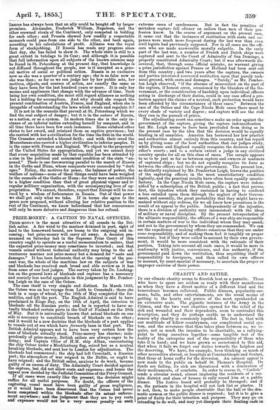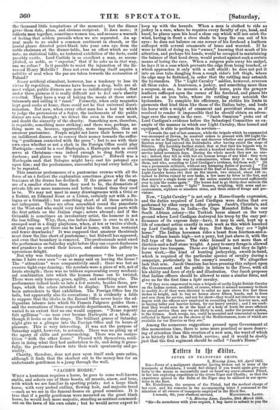CHARITY AND SATIRE.
IN our climate charity seems to flourish beat as a parasite. Those who have to spare are seldom so ready with their munificence as when they have a direct' motive of a different kind and the benevolence becomes collateral. Pablio dinners, popularity-ser- mons, balls, and other entertainments, are the usual means of getting to the hearts and purses of the most openhanded on an extensive scale. The gigantic instance of the Army in the Crimea, and the two vast charities opened for the relief of the sick and wounded and their dependents, seem to contradict this description, and they do perhaps enable us to understand the reason why charity is commonly lopsided. The fact is, that with our multitude of fellow countrymen, our complicated social sys- tem, and the severance that thus takes place between us, we re- quire, not so much the impulse to be charitable, as a rallying- point to bring ourselves together—some tangible test of the reality of the enterprise and of the responsibility of those who take it in hand ; and we have grown so accustomed to this aid, that when it fails we forget our duties towards the helpless and the deserving. We have, for example, been thinking so much of other necessities abroad, or hospitals at Constantinople and Scutari, that those at home suffer for the diversion. An earnest appeal is now made to the public on behalf St. Thomas's Hospital. Its funds are failing, its sick are threatened with a diminution of their medicaments, of comforts. In order to rescue it, " Carlisle" sends a circular round, almost imploring the residents of a cer- tain district and class of houses to rally round him at a publie- dinner. The festive board will probably be thronged ; an& if so, the patients in the hospital will not lack lint or plaster. It is not, then, to make people charitable that the ball or the dra- matic sermon or the public dinner is required ; but it is to give a point of fixity for their intention and purpose- They may go on intending to do well, and may yet dissipate their floating cash in • 'the thousand little temptations of the moment ; but the dinner gives them date, place, and obvious recipient. It does more; it collects men together, sometimes women too, and arouses a warmth of feeling that seldom prevails when we are separated. An ap- peal made to us under a common sentiment in church, or the genial glance directed point-blank into your own eye from the noble chairman at the dinner-table, has an effect which no cold note, no statistical table, no technical exhibition of the facts, could possibly excite. Lord Carlisle is so excellent a man, so accom- plished, so noble, so " superior," that if he asks us in that way, can we refuse ? Is it possible to resist the injunction of the Re- verend Henry Melville ? Does not even dancing itself acquire a nobility of soul when the pas are taken towards the restoration of Poland ?
Every artificial stimulant, however, has a tendency to lose its virtue by repetition. Sermons have become a drug, balls are al- most vulgar, public dinners are now so indifferently cooked, that under three guineas it is really difficult not to feel one's charity revolted. They have a way of baking the meats at these enter- tainments and calling it " roast." Formerly, when only magnates kept good cooks at home, there could not be that universal discri- mination. But now, when every other man has a test by which to judge the pretensions of a Soyer, the incitements of the public dinner are seen through ; we detect the oven in the roast meat, and doubt the sincerity of the charity. Something new, therefore, is requisite, something more striking; and there was, perhaps, no- thing more so, because, apparently, more impossible, than an amateur pantomime. People might not leave their homes to eat an indifferent dinner, or to convey their money towards the suffer- ing " gentleman connected with the press "; but to see with their own eyes whether or not a clerk in the Foreign Office could play Harlequin—could be a real Harlequin, a Harlequin such as could serve at Christmas—was indeed enough to drag forth every duchess ; and places rose to " fabulous prices." Bidwell was a Harlequin such that Bologna might have cast his paternal eye upon him; and the performance, successful beyond every belief, is to be repeated. This amateur performance of a pantomime crowns with all the force of an a fortiori the explanation sometimes given why the at- tendance at the drama has declined. If the princes of the stage are of a smaller stature than they used to be, the dramatists of private life are more numerous and better trained than they used to be. We may not meet in many drawingrooms with a Grisi or a Rubini, an Edmund Kean or a Liston, certainly not with a Bo- logna or a Grimaldi ; but something short of all these artists is not infrequent. Those are often assembled round the pianoforte at the West-end who could very fairly take the second parts with the first artists on the Italian stage ; actors abound ; and if the Grimaldi is sometimes an involuntary artist, the humour is not the less telling. Why, then, rise before dinner is over to sit in a cramped seat in a dingy playhouse, when, at ten or twelve o'clock, all that you can get there can be had at home, with less restraint and fewer drawbacks ? It was supposed that amateur theatricals must draw the line short of pantomime ; but Bidwell has appeared, and even that boundary is removed. The professionals must excel the performance on Saturday night before they can expect duchesses and grandees to crowd their houses, and emulate the gallery in uproarious delight.
But why was Saturday night's performance "the best iianto- mime I have ever seen "—as so many said on leaving the house ? The " attractions" were comparatively small ; there was but an evasive tight-rope dancing ; the acrobats were a piece of wit, not of brute strength ; there was no tableau representing every mechani- cal combination into which the human frame can be twisted. There were only humour, grace, agility, and something else. The performance indeed leads us into a few secrets, besides those, per- haps, which the actors intended to display. There must have been antecedents to that exhibition. The Foreign Office has its toils, but apparently also its recreations ; it is evidently a fable to suppose that the clerks in the Record Office never leave the ad- tiquarian labours into which Sir Francis Palgrave guides them ; and the recreations of those respectable departments, it seems, are varied to an extent that no one would suppose. "" Nemo repentd fuit agillimus "—no man ever became Harlequin at a blow, al- though it looks so on the stage. The brilliant graces of Saturday night give us a glimpse into the Foreign Office and its hours of pleasure. This is very interesting. It was not the purpose of Saturday night, however, to astonish. There was no piling up of the agony of stilts and posturemaking. There was no compe- tition " with the other house." Pleased with themselves, confi- dent in doing what they had undertaken to do, and doing it grace- fully, the performers threw into their work spontaneity and ge- niality. therefore, does not pass upon itself such pure satire, although it finds that the shortest cut to the money-box for an unfortunate gentleman is a jump through the wall.



























 Previous page
Previous page